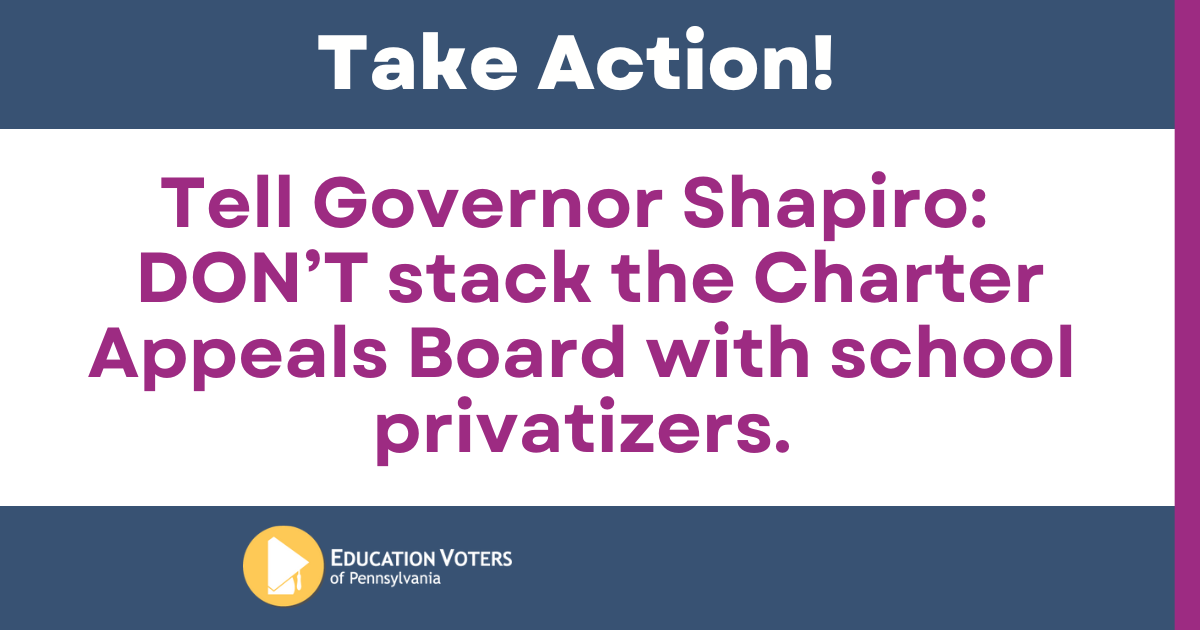An article in the August 13th Philadelphia Inquirer (These backroom deals helped Gov. Josh Shapiro complete the Pa. state budget) set off alarm bells among advocates who support strong public schools in the commonwealth. This article reports Senate President Pro Tempore, Kim Ward (R-Westmoreland) claiming Republicans cut a troubling deal with Governor Shapiro:
“Because the school voucher program faced a veto, Ward said she needed an agreement from Shapiro to help students who attend failing schools.
Ward told The Inquirer that Shapiro promised to improve the efficiency of the state’s Charter Appeals Board, which can overrule school boards’ decisions about opening new charter schools or closing existing ones. GOP leaders said they want that board, chaired by Shapiro’s secretary of education, to do more to help students attend charter schools in Philadelphia.”
Ward’s statement that she wants the CAB “to do more to help students attend charter schools in Philadelphia” is a not so subtle way of saying that Republican leaders want members appointed to the CAB who will operate with a political agenda to expand charter schools, regardless of the merit of their proposals or whether they actually comply with the law.

It’s no secret that school privatization is a top Republican priority in Harrisburg. For a full month the Republican-led Senate refused to return to Harrisburg to sign the budget that they had approved because Governor Shapiro line item vetoed $100 million for school vouchers. And they recently passed code bills that, once again, include a new voucher program (more on this in a future post!).
Further, the comments reported in the media, whether accurate or inaccurate, threaten to undermine public faith that the CAB will act impartially when making decisions that will have an extraordinary financial impact on taxpayers in school districts throughout the commonwealth.
The stakes with the appointments to the CAB are high. The CAB plays a critical role in ensuring that schools comply with the law’s requirements and that individuals who propose charter schools do so as well. The CAB also also has sweeping powers to override the decision of locally elected school board members and force local taxpayers to pay tuition bills to charter schools that their community did not approve.
In order for the public to trust in the integrity of Pennsylvania’s Charter Appeals Board, Governor Shapiro must appoint and the Senate must approve a balanced slate of qualified nominees who will be impartial and willing to fulfill the important responsibilities of the CAB. And all parties must ensure a public process and thorough vetting of all candidates.
Additional Background on the Charter Appeals Board
To learn more about the Charter Appeals Board click HERE to read a letter that advocates sent Governor Shapiro that has extensive Background information.
In a nutshell, in 1997 the legislature created the Charter Appeals Board and empowered it to decide if a local school board’s rejection of a charter application or renewal was appropriately decided within the confines of the 1997 new Charter School Law.
When charter schools appeal to the CAB because they do not like the decision their school board has made, the CAB has the authority to override the local school board’s decision and give the charter school a green light to open or continue to operate unless and until the school district challenges the CAB decision in Commonwealth Court.


Recent Comments